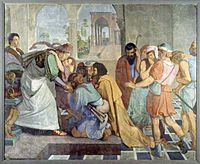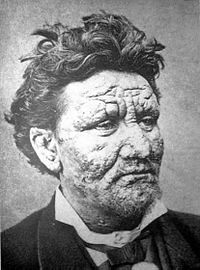
In the biblical books Exodus, Leviticus and Numbers, Nadab and Abihu were the two oldest sons of Aaron. According to Leviticus 10, they offered a sacrifice with "foreign fire" before the LORD, disobeying his instructions, and were immediately consumed by God's fire.
A mohel is a Jewish man trained in the practice of brit milah, the "covenant of male circumcision". The equivalent for women is mohelet.
The Hittites, also spelled Hethites, were a group of people mentioned in the Hebrew Bible. Under the names בני-חת and חתי they are described several times as living in or near Canaan between the time of Abraham and the time of Ezra after the return of the Jews from the Babylonian exile. Their ancestor was Heth.

In Judaism, ritual washing, or ablution, takes two main forms. Tevilah (טְבִילָה) is a full body immersion in a mikveh, and netilat yadayim is the washing of the hands with a cup.

Unleavened bread is any of a wide variety of breads which are prepared without using rising agents such as yeast. Unleavened breads are generally flat breads; however, not all flat breads are unleavened. Unleavened breads, such as the tortilla and roti, are staple foods in Central America and South Asia, respectively. Unleavened sacramental bread plays a major part in Christian liturgy and Eucharistic theology.
The Priestly Code is the name given, by academia, to the body of laws expressed in the Torah which do not form part of the Holiness Code, the Covenant Code, the Ritual Decalogue, or the Ethical Decalogue. The Priestly Code constitutes the majority of Leviticus, as well as some of the laws expressed in Numbers. The code forms a large portion, approximately one third, of the commandments of the Torah, and thus is a major source of Jewish law.

Yitro, Yithro, Yisroi, Yisrau, or Yisro is the seventeenth weekly Torah portion in the annual Jewish cycle of Torah reading and the fifth in the Book of Exodus. The parashah tells of Jethro's organizational counsel to Moses and God's revelation of the Ten Commandments to the Israelites at Mount Sinai.

Parashat Vayikra, VaYikra, Va-yikra, Wayyiqra, or Wayyiqro is the 24th weekly Torah portion in the annual Jewish cycle of Torah reading and the first in the Book of Leviticus. The parashah lays out the laws of sacrifices. It constitutes Leviticus 1:1–5:26.

Tzav, Tsav, Zav, Sav, or Ṣaw is the 25th weekly Torah portion in the annual Jewish cycle of Torah reading and the second in the Book of Leviticus. The parashah teaches how the priests performed the sacrifices and describes the ordination of Aaron and his sons. The parashah constitutes Leviticus 6:1–8:36. The parashah is made up of 5,096 Hebrew letters, 1,353 Hebrew words, 97 verses, and 170 lines in a Torah scroll. Jews read it the 24th or 25th Sabbath after Simchat Torah, generally in the second half of March or the first half of April.

Tazria, Thazria, Thazri'a, Sazria, or Ki Tazria' is the 27th weekly Torah portion in the annual Jewish cycle of Torah reading and the fourth in the Book of Leviticus. The parashah deals with ritual impurity. It constitutes Leviticus 12:1–13:59. The parashah is made up of 3,667 Hebrew letters, 1,010 Hebrew words, 67 verses, and 128 lines in a Torah Scroll.
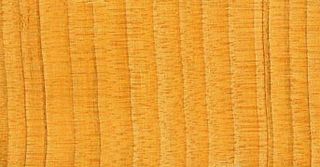
Metzora, Metzorah, M'tzora, Mezora, Metsora, M'tsora, Metsoro, Meṣora, or Maṣoro is the 28th weekly Torah portion in the annual Jewish cycle of Torah reading and the fifth in the Book of Leviticus. The parashah deals with ritual impurity. It addresses cleansing from skin disease, houses with an eruptive plague, male genital discharges, and menstruation. The parashah constitutes Leviticus 14:1–15:33. The parashah is made up of 4,697 Hebrew letters, 1,274 Hebrew words, 90 verses, and 159 lines in a Torah Scroll.
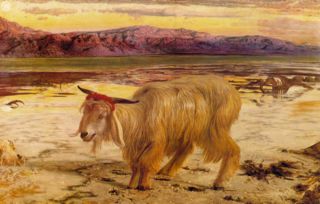
Acharei Mot is the 29th weekly Torah portion in the annual Jewish cycle of Torah reading. It is the sixth weekly portion in the Book of Leviticus, containing Leviticus 16:1–18:30. It is named after the fifth and sixth Hebrew words of the parashah, its first distinctive words.

Emor is the 31st weekly Torah portion in the annual Jewish cycle of Torah reading and the eighth in the Book of Leviticus. The parashah describes purity rules for priests, recounts the holy days, describes the preparations for the lights and bread in the sanctuary, and tells the story of a blasphemer and his punishment. The parashah constitutes Leviticus 21:1–24:23. It has the most verses of any of the weekly Torah portions in the Book of Leviticus, and is made up of 6,106 Hebrew letters, 1,614 Hebrew words, 124 verses and 215 lines in a Torah Scroll.

Chukat, HuQath, Hukath, or Chukkas is the 39th weekly Torah portion in the annual Jewish cycle of Torah reading and the sixth in the Book of Numbers. The parashah sets out the laws of corpse contamination and purification with the water of lustration prepared with the Red Cow. It also reports the deaths of Miriam and Aaron, the failure of Moses at the Waters of Meribah, and the conquest of Arad, the Amorites, and Bashan. The parashah comprises Numbers 19:1–22:1. The parashah is the shortest weekly Torah portion in the Book of Numbers, and is made up of 4,670 Hebrew letters, 1,245 Hebrew words, 87 verses, and 159 lines in a Torah Scroll.
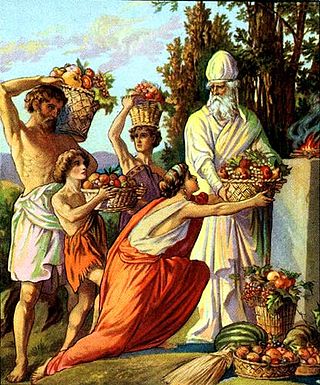
Ki Tavo, Ki Thavo, Ki Tabo, Ki Thabo, or Ki Savo is the 50th weekly Torah portion in the annual Jewish cycle of Torah reading and the seventh in the Book of Deuteronomy. It comprises Deuteronomy 26:1–29:8. The parashah tells of the ceremony of the first fruits, tithes, and the blessings from observance and curses from violation of the law.

"John the Revelator" is a gospel blues call and response song. Music critic Thomas Ward describes it as "one of the most powerful songs in all of pre-war acoustic music ... [which] has been hugely influential to blues performers". American gospel-blues musician Blind Willie Johnson recorded "John the Revelator" in 1930. Subsequently, a variety of artists, including the Golden Gate Quartet, Son House, Depeche Mode, Jerry Garcia Band, The White Stripes, The Forest Rangers, The Sword, have recorded their renditions of the song, often with variations in the verses and music.
In Jewish ritual law, a zav is a man who has had abnormal seminal discharge from the male sexual organ, and thus entered a state of ritual impurity. A woman who has had similar abnormal discharge from her genitals is known as a zavah.
The Hebrew term kareth, or extirpation, is a form of punishment for sin, mentioned in the Hebrew Bible and later Jewish writings. Kareth in its simplistic meaning refers to an individual being expelled from the Nation of Israel. In the Talmud, kareth means not necessarily physical "cutting off" of life, but can also mean the extinction of the soul and denial of a share in the world to come.

Thou shalt not kill, You shall not murder or You shall not murder (NIV), is a moral imperative included as one of the Ten Commandments in the Torah.
Rabbi Alexandri is the name of one or more amoraim.







